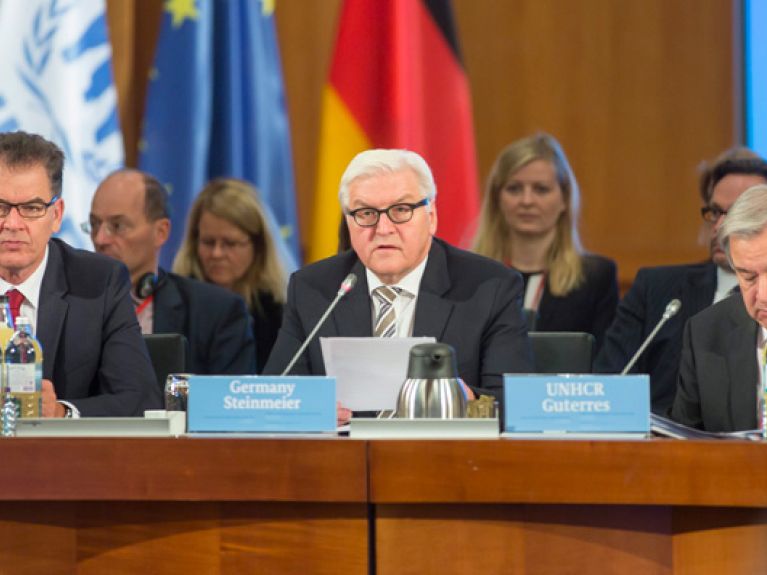“More support is needed”
The United Nations High Commissioner for Refugees António Guterres talks about the dramatic situation of refugees from Syria and Iraq and Germany‘s role in providing protection.

You have been the United Nations High Commissioner for Refugees for almost ten years now. How has the situation changed since you took office in 2005?
Global forced displacement has grown significantly in the last decade. When I became High Commissioner, about 38 million people worldwide were either refugees or internally displaced as a result of violence and persecution. At the end of 2013, the global statistics showed over 51 million people forcibly displaced. The number of conflicts has increased in recent years, older crises are not getting resolved, and humanitarian needs only keep growing as a result.
Is there any reason for you to be optimistic that this will change?
I am not optimistic that this trend is going to be reversed any time soon – there is little international capacity to prevent and resolve conflict, and factors such as population growth, climate change and food and water scarcity only contribute to growing humanitarian needs and to displacement. One important point however is that the institution of asylum – with some exceptions – is still largely respected, and most people fleeing conflict and persecution are able to find protection. But with the vast majority of refugees hosted in developing countries, more international support is needed to ensure they can cope.
What is happening in Syria and Iraq has led to a humanitarian catastrophe. Is the international community living up to its responsibility concerning the people fleeing these countries?
The support from humanitarian donors has been very significant, but the needs are so vast that it is nowhere near enough. And because the refugee outflow has been so massive, the impact on the neighbouring countries is huge, in addition to the very serious security implications which the conflict in Syria has created for the whole region. So in order to protect and assist the people who have fled from Syria, it is absolutely vital to also support the countries who have taken them in, because the strain on their public infrastructure, on their hospitals, schools, on the budgets of these governments is just too enormous. With Syria, for the first time, we have a massive refugee crisis in middle income countries, and most of the refugees are in urban areas – this goes far beyond the capacities of humanitarian agencies, and development actors have to come in now to help stabilise the situation and address the structural needs created in the host countries.
Germany is currently facing the highest number of refugees since the mid-1990s. Was the country well prepared for that?
In the European context, Germany has a long-standing tradition of asylum. With this current crisis, many local authorities as well as private citizens have made enormous efforts and are working very hard to welcome and show solidarity with those who are in need of protection. I appreciate that very much, as it requires a broad consensus in society. Of course, when providing accommodation for people seeking protection, this requires humane standards and a refuge that is more than a bed for the night. Given the rising numbers of asylum seekers, I am fully aware of how challenging that can be, and I am confident that the necessary improvements as well as the expansion of reception capacities are now considered an important political task.
You have been critical about the lack of harmonisation in European migration and asylum policy. In 2013, the European Parliament gave the green light to a new European asylum system. Is Europe heading in the right direction?
The recast asylum laws that were adopted last year under the Common European Asylum System are indeed an important step forward. But the asylum systems in several European countries remain quite fragile.
In what way?
Asylum seekers have difficulties accessing territories and asylum procedures, there are enormous differences in recognition rates between EU members for people from the same country, and there is often not enough integration support for recognised refugees. Many countries in Europe are affected by irregular mixed movements of refugees and migrants, and they struggle with these very complex challenges. Countries in the EU’s eastern and southeastern regions, as well as along the external border, face a particularly difficult task. The recurring, dramatic and sad loss of life in the Mediterranean is one example, and now that Italy’s Mare Nostrum operation is coming to an end, with no similarly strong search and rescue capacity replacing it, I am worried this could lead to more deaths at sea. But globally, Europe receives only about 8% of the world’s refugees and asylum seekers, so finding solutions to these challenges is realistic.
What will be the main challenges in terms of helping refugees in the near future, and which other countries apart from Syria and Iraq are you especially concerned about?
Media attention and public interest is mainly focused on the Middle East and on Ukraine, but for UNHCR, our biggest financial requirements and staff capacity are in fact in Africa. South Sudan and the Central African Republic are challenging humanitarian crises at the moment, and they have also created significant displacement, internally and externally. In addition, the fact that so many long-standing crises do not get resolved means some refugee crises have been going on for decades. Somalia and Afghanistan are both examples of these “protracted refugee situations” where we are working very closely with the countries concerned, the host states and other organisations to ensure that there is a comprehensive strategy for durable solutions, but that refugees continue to enjoy protection in the meantime. ▪
Interview: Helen Sibum

